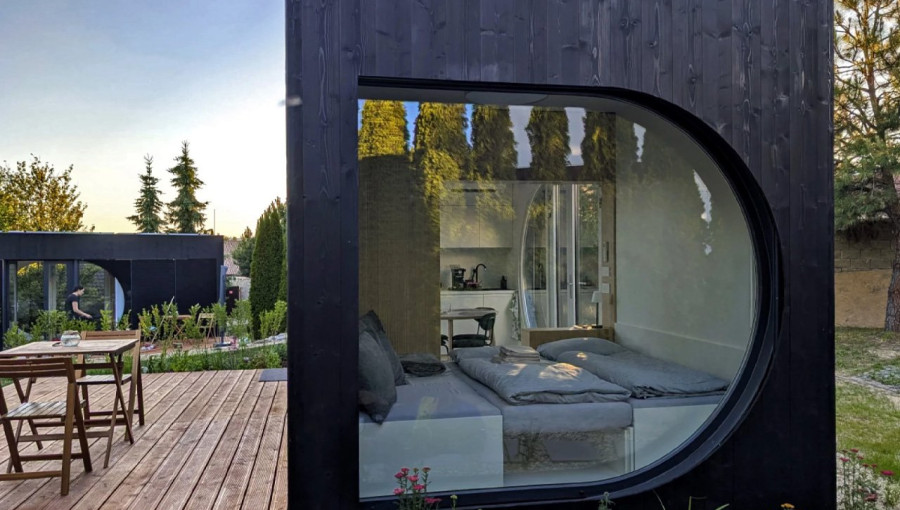The new Ecocapsule Box from Slovakia represents a significant shift in modular, off-grid living. This compact home sports a rectangular shape, maximizing livability while offering a clean aesthetic. At 26 feet long and 9 feet wide, it features extensive glass panels that merge indoor and outdoor spaces, allowing natural light to enhance the interior. Inside, it has a flexible layout with a convertible sofa, ample storage solutions, and integrated off-grid systems, including solar panels and water collection. The modular design allows for easy expansion, making sustainable living more accessible and adaptable.
Slovakia’s Ecocapsule has traded its famous egg shape for something far more sensible. The new Ecocapsule Box ditches the quirky pod aesthetic for a clean rectangular form that feels refreshingly honest about what it is—a tiny home that wants you to live in it. At 26 feet long and 9 feet wide, this isn’t about making a statement or going viral on Instagram. It’s about creating a space where you can exist off-grid without feeling like you’re camping indefinitely. The proportions work beautifully, offering real room to move while staying compact enough to relocate when wanderlust strikes. What instantly grabs you is how much glass they’ve packed into this steel frame. Panoramic windows stretch across entire walls, dissolving the boundary between inside and outside. Natural light pours in from every direction, making the compact interior feel expansive rather than cramped. These aren’t just windows; they’re designed to be architectural moves that transform the Box into something closer to a glass pavilion than a traditional cabin. The transparency creates this wonderful sense of living within the landscape rather than simply being dropped into it.
The interior layout feels surprisingly sophisticated for something this size. A convertible sofa transforms into a proper bed, while a separate bedroom accommodates couples or small families comfortably. Storage lives beneath beds and is built into every available nook, keeping surfaces clean and uncluttered. The kitchen flows naturally into the dining area without forced transitions or awkward divisions. Everything connects logically, creating zones that feel distinct yet unified. It’s the kind of thoughtful planning that makes small spaces actually livable rather than just survivable. Solar panels handle all the power needs, creating true energy independence that goes beyond marketing speak. The integrated systems manage everything from lighting to climate control without requiring any connection to traditional utilities. Water collection and waste management complete the self-sufficient package. These technical elements stay invisible, letting the architecture speak without mechanical noise.
Three trim levels start at €55,000 for the basic setup, making off-grid living accessible to people who couldn’t justify the €99,000 price tag of the original egg-shaped Ecocapsules. The modular approach means you can start simple and expand later or connect multiple units for larger living arrangements. This flexibility transforms the Box from a one-size-fits-all solution into something that can grow and adapt with changing needs. The Ecocapsule Box succeeds because it feels normal. Where the original pod demanded attention and explanation, this rectangular design slides quietly into any landscape. It’s sustainable living without the performance aspect, appealing to people who want to live differently without announcing it to the world. Slovakia’s latest creation proves that good design doesn’t need to be radical—sometimes the best innovation is simply making something work better.
The Ecocapsule Box packs a lot of thoughtful design into a small footprint. It’s built with a sturdy steel frame and huge windows that let in tons of natural light, so the space always feels bright and connected to the outdoors. Inside, you get a flexible two-room layout—a living area with a sofa that turns into a bed, plus a separate bedroom and plenty of clever storage. The real magic is in the off-grid systems: solar panels and a big battery keep everything powered, and there’s rainwater collection and smart waste management built in. You can choose from basic, standard, or full off-grid versions, and there are lots of ways to customize the setup to fit

